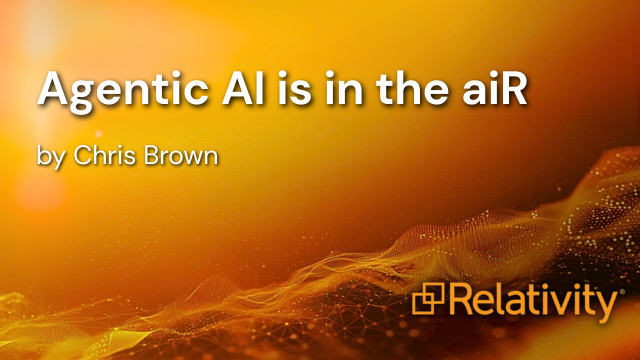
[EDRM Editor’s Note: This article was first published here on June 10, 2025, and EDRM is grateful to Trusted Partner Relativity for permission to republish.]
Perceive. Think. Act. It sounds a little like a play on our mission here at Relativity: to help our customers organize data, discover the truth, and act on it.
Of all the AI buzzwords we’ve come across over the last few years, “agent” or “agentic” is quickly becoming the loudest. You’ve probably heard of agentic AI: systems that can perceive, think, and act on their own, built to perform tasks autonomously based on users’ instructions. But definitions abound and realistic applications of this new AI “workforce” can be tough to grasp—especially in a field as deliberative and consequential as the practice of law.
Today, at Relativity Fest London, we’re proud to connect with and celebrate our global community while sharing some of the most exciting developments across our platform. In our keynote, I touched on one of the most talked-about topics in tech today: agentic AI. What is it, can legal teams trust it, and how are we approaching it at Relativity?
Agentic AI: systems that can perceive, think, and act on their own, built to perform tasks autonomously based on users’ instructions.
Chris Brown, Chief Product Officer, Relativity.
Because this space is evolving rapidly—and the implications for legal work are significant—we’re digging deeper here on The Relativity Blog to help you cut through the noise, understand what agentic AI really is, and learn how our teams are building innovative, reliable, and high-performing solutions with this technology at the core.
Agentic AI: What It Is and Why You Should Care
Agentic AI encompasses systems that perceive, think, and act on their own to meet user-set goals. Such a system has access—via APIs or other connectors—to the other platforms it needs to work within, whether it’s enterprise software, online resources, or other services. When a user assigns an agentic system a task, it can autonomously follow those instructions in a multi-step way to deliver the requested result.
One example of agentic AI is moving all around already: the self-driving car. Fully autonomous vehicles are tasked with getting passengers safely from point A to point B. To do so, they must perceive their environment to evaluate routes and potential dangers, think about the most efficient and safest way to reach their destination by anticipating other drivers’ behaviors, and act via steering, accelerating, braking, and other mechanical functions to complete this task.
A digital example would be the customer service chatbots you interact with on a regular basis as a consumer. These tools must perceive the needs of a customer based on the user’s input and accessible data about their account or transactions, think about the best way to satisfy the user’s requests or solve their problem based on the resources available, and act out those solutions by issuing refunds or reorders, flagging delivery failures, and so on.
Put simply, agentic AI builds on the capabilities of generative AI—not just generating text or images but executing complex instructions to complete meaningful tasks. For legal teams, this unlocks powerful opportunities to automate routine work, accelerate higher-order thinking, and focus human talent on the most strategic, impactful efforts.
It interprets a user’s objectives, extracts facts, crafts summaries, and builds chronologies—making decisions such as what counts as a key fact, what belongs in a witness summary, or what question to ask in a deposition.
Chris Brown, Chief Product Officer, Relativity.
Relativity aiR is Agentic
Relativity aiR is already transforming how legal teams work by combining the power of agentic AI with human guidance to achieve extraordinary speed, accuracy, and impact.
Relativity aiR for Review and aiR for Privilege leverage natural language input to understand the intent behind assigned coding tasks. From there, the system engages in multi-step reasoning—analyzing documents, identifying key passages as citations, weighing arguments for and against relevance or privilege, and ultimately acting by making and applying informed coding decisions. These agentic workflows have been applied across millions of documents, outperforming traditional methods in both speed and precision. As one client put it, “aiR is the team you never thought you could have this early in the case—and it’s ready to work nights and weekends.”
Relativity aiR for Case Strategy applies the same intelligence to help lawyers build stronger cases, faster. It interprets a user’s objectives, extracts facts, crafts summaries, and builds chronologies—making decisions such as what counts as a key fact, what belongs in a witness summary, or what question to ask in a deposition.
At the same time, human guidance and proven validation methods promote trustworthy decision making by the AI system. aiR solutions have purposeful constraints (for example, those established by prompt criteria frameworks built from human inputs, a guided project setup process, and limited access to defined data sets upon which it can base its decisions), and users can deeply understand aiR’s decisions based on the supporting information it provides, such as rationales, considerations, and citations, which sit alongside well-established processes for measuring recall, precision, and elusion.
The bottom line? Relativity aiR enables agentic workflows that can eliminate repetitive, time-consuming cognitive tasks—producing better results, faster. It can review thousands of documents per hour, operate 24/7, and complete tasks that once required dozens of people—all while you remain in control, directing and confirming its output. This collaboration between human and artificial intelligence is what will drive the next frontier of legal innovation, empowering professionals to focus on what matters most.
AI Principles in Action
As agentic systems and autonomous decision-making become increasingly common in the legal industry, we believe it is critical for users to guide, validate, and maintain control over AI’s decisions. Fully autonomous agents—such as those creating and executing code without human oversight—do not belong in legal tech. Keeping humans involved ensures AI remains ethical, practical, and defensible.
Fully autonomous agents—such as those creating and executing code without human oversight—do not belong in legal tech. Keeping humans involved ensures AI remains ethical, practical, and defensible.
Chris Brown, Chief Product Officer, Relativity.
In line with our AI Principles at Relativity, we will soon introduce built-in statistical validation for aiR for Review. Leveraging our experience with TAR validation standards and insights from an expert panel of users, this enhancement will further ensure aiR’s agentic decisions are transparent, measurable, and reliable. Additionally, automated validation processes will provide clearer, easier-to-reference calculations, enhancing user clarity and control.
With these commitments, Relativity remains dedicated to empowering customers to tackle their most complex legal challenges using the best-suited technologies. Where the use of agentic AI is appropriate, we will continue to thoughtfully incorporate it into our solutions.
In Summary
Agentic AI is reshaping the way legal teams organize, discover, and act on information, empowering your teams to operate at unprecedented levels of efficiency and effectiveness. At Relativity, our mission is to continually bring you cutting-edge AI innovations through RelativityOne and aiR—ensuring you have all the clarity, control, and confidence you deserve as we shape the future of legal technology together.
Read the original article here.
Assisted by GAI and LLM Technologies per EDRM GAI and LLM Policy.


